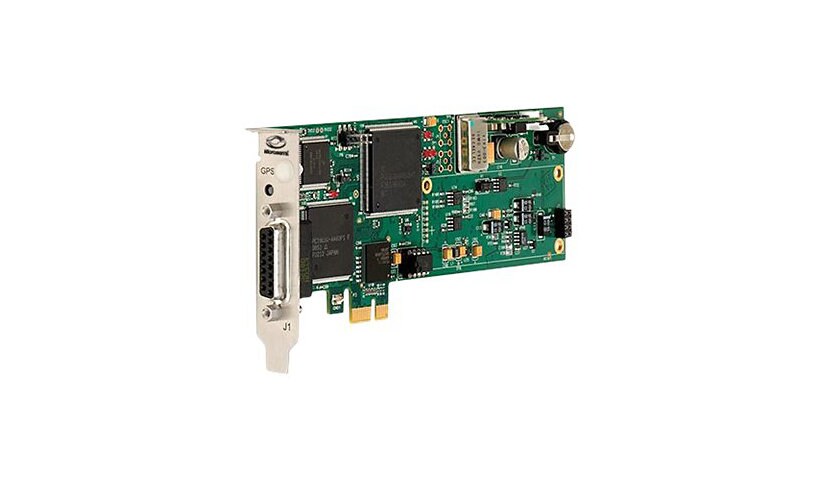
Know your gear
The Microchip bc635PCI-V2 timing module provides unparalleled precise time and frequency to the host computer and peripheral data acquisition systems. Time is typically acquired from time code signals such as IRIG B. Central to the operation of the module is a disciplined 10 MHz oscillator that is either an onboard TCXO or an offboard external oscillator that can provide the timing module's 100-nanosecond clock.
Current time (days to 100 ns) can be accessed across the PCI bus with no PCI bus wait states, which allows for very high-speed time requests. The selected on-board or off-board 10 MHz oscillator drives the module's frequency and time code generator circuitry. If the input reference is lost, the module will continue to maintain time (flywheel) based on the selected 10 MHz oscillator's drift rate. If power is lost, a battery-backed real-time clock (RTC) is available to maintain time. Extensive time code generation and translation are supported. The generator outputs either IRIG A, B, G, E, IEEE 1344, NASA 36, XR3, or 2137 in both amplitude modulated (AM) and DC level shift (DCLS) formats. The translator reads and may be used to discipline the 10 MHz oscillator to either the AM or DCLS format of IRIG A, B, G, E, IEEE 1344, NASA 36, XR3, or 2137 time codes.
The module also has a state-of-the-art direct digital synthesizer (DDS) rate synthesizer capable of 0.0000001PPS to 100MPPS. The module may also be programmed to generate a single interrupt at a predetermined time based on a time compare (strobe). An event time capture feature provides a means of latching time of an external event. A key feature of the bc635PCI-V2 is the ability to generate interrupts on the PCI bus at programmable rates. These interrupts can be used to synchronize applications on the host computer as well as signal-specific events. The external frequency input is a unique feature allowing the time and frequency of the bc635PCI-V2 to be derived from an external oscillator that may also be disciplined (DAC voltage controlled) based on the selected input reference. The module may be operated in generator (undisciplined) mode where an external 10 MHz from a Cesium or Rubidium standard is used as the frequency reference. This creates an extremely stable PCI-based clock for all bc635PCI-V2 timing functions. The bc635PCI-V2 automatically supports both 3.3 V and 5.0 V signaling of the PCI bus. Integration of the module is easily facilitated with optional drivers for Windows, Linux, or Solaris.
Current time (days to 100 ns) can be accessed across the PCI bus with no PCI bus wait states, which allows for very high-speed time requests. The selected on-board or off-board 10 MHz oscillator drives the module's frequency and time code generator circuitry. If the input reference is lost, the module will continue to maintain time (flywheel) based on the selected 10 MHz oscillator's drift rate. If power is lost, a battery-backed real-time clock (RTC) is available to maintain time. Extensive time code generation and translation are supported. The generator outputs either IRIG A, B, G, E, IEEE 1344, NASA 36, XR3, or 2137 in both amplitude modulated (AM) and DC level shift (DCLS) formats. The translator reads and may be used to discipline the 10 MHz oscillator to either the AM or DCLS format of IRIG A, B, G, E, IEEE 1344, NASA 36, XR3, or 2137 time codes.
The module also has a state-of-the-art direct digital synthesizer (DDS) rate synthesizer capable of 0.0000001PPS to 100MPPS. The module may also be programmed to generate a single interrupt at a predetermined time based on a time compare (strobe). An event time capture feature provides a means of latching time of an external event. A key feature of the bc635PCI-V2 is the ability to generate interrupts on the PCI bus at programmable rates. These interrupts can be used to synchronize applications on the host computer as well as signal-specific events. The external frequency input is a unique feature allowing the time and frequency of the bc635PCI-V2 to be derived from an external oscillator that may also be disciplined (DAC voltage controlled) based on the selected input reference. The module may be operated in generator (undisciplined) mode where an external 10 MHz from a Cesium or Rubidium standard is used as the frequency reference. This creates an extremely stable PCI-based clock for all bc635PCI-V2 timing functions. The bc635PCI-V2 automatically supports both 3.3 V and 5.0 V signaling of the PCI bus. Integration of the module is easily facilitated with optional drivers for Windows, Linux, or Solaris.
Add to Compare
